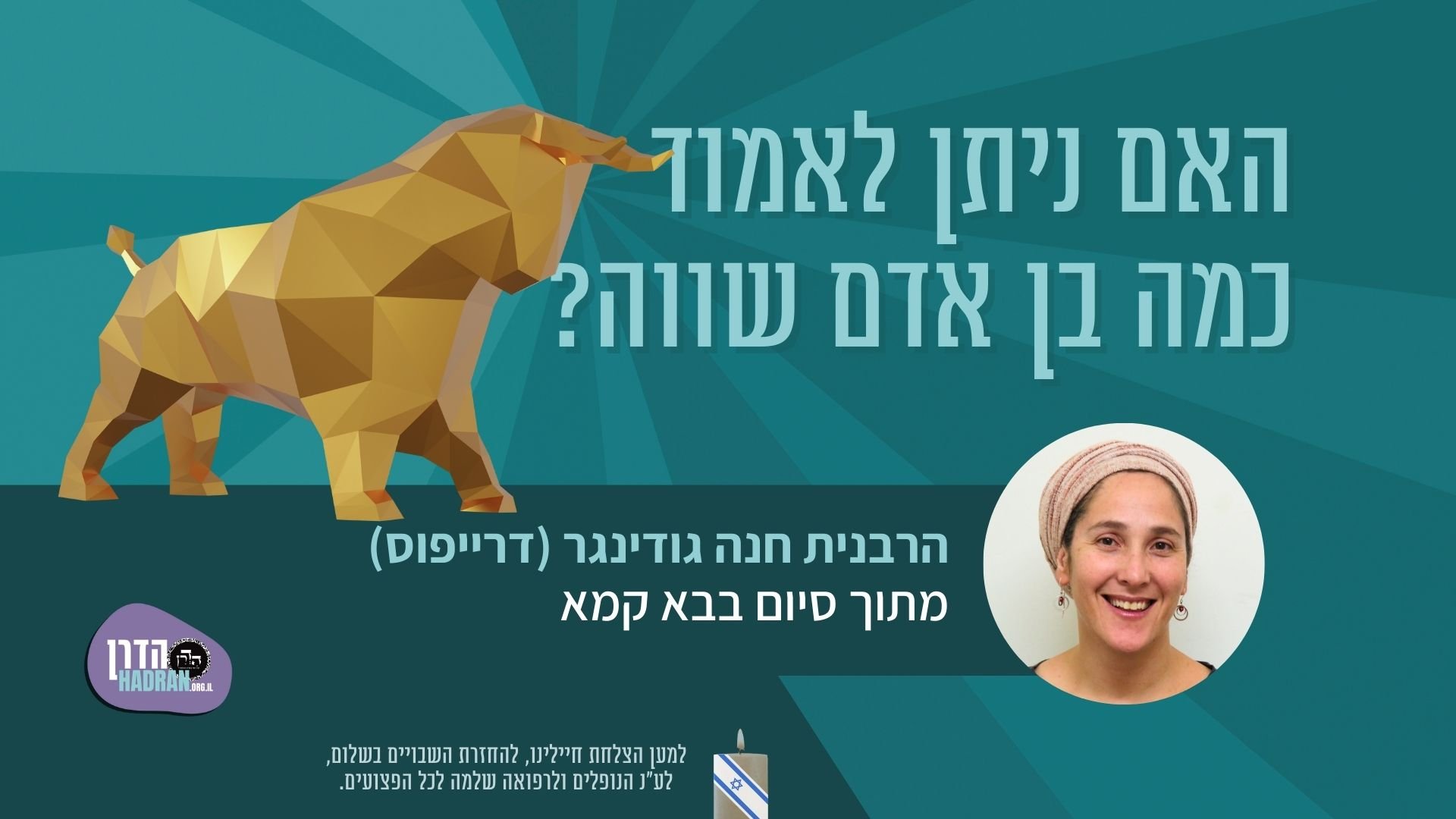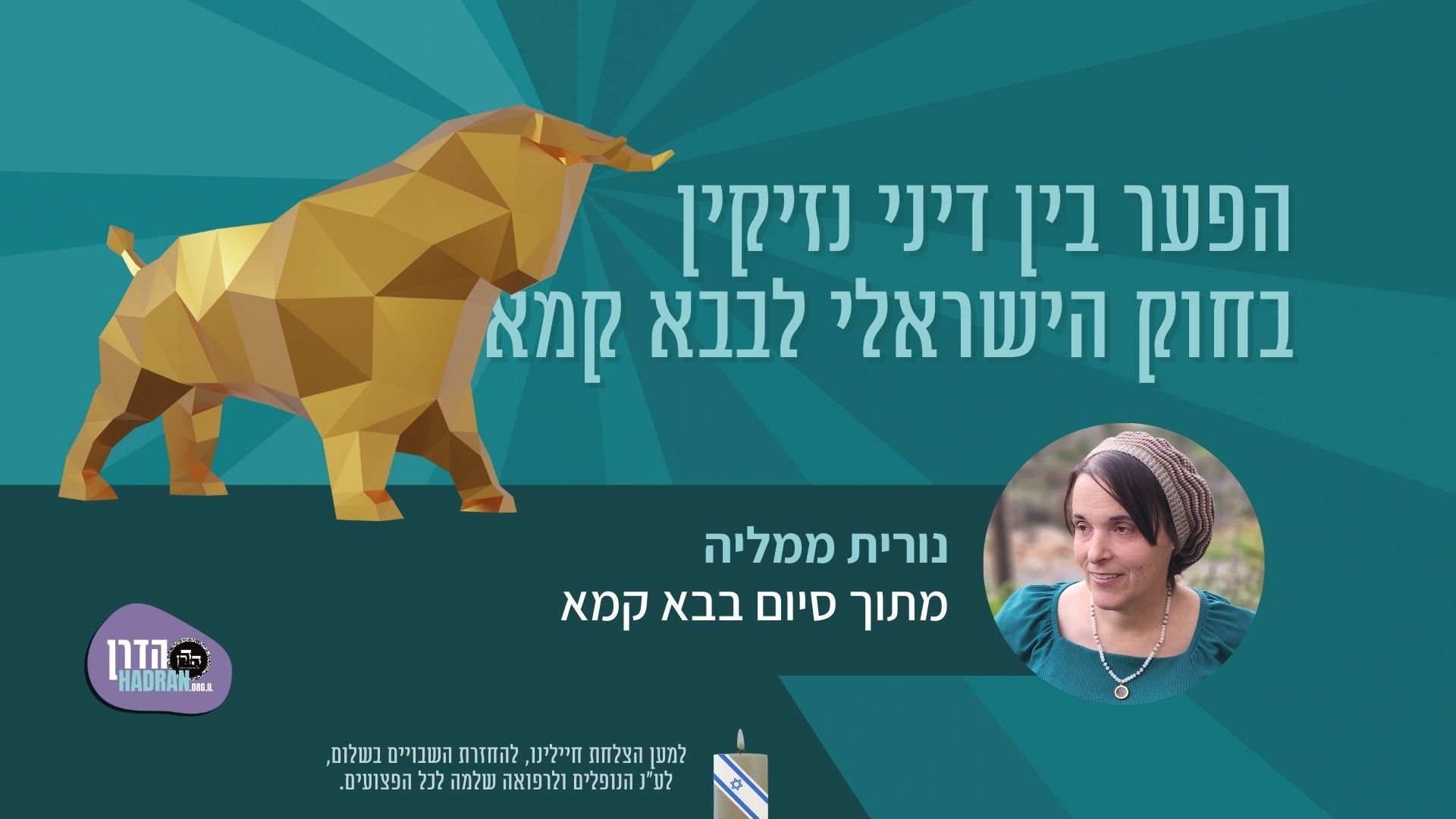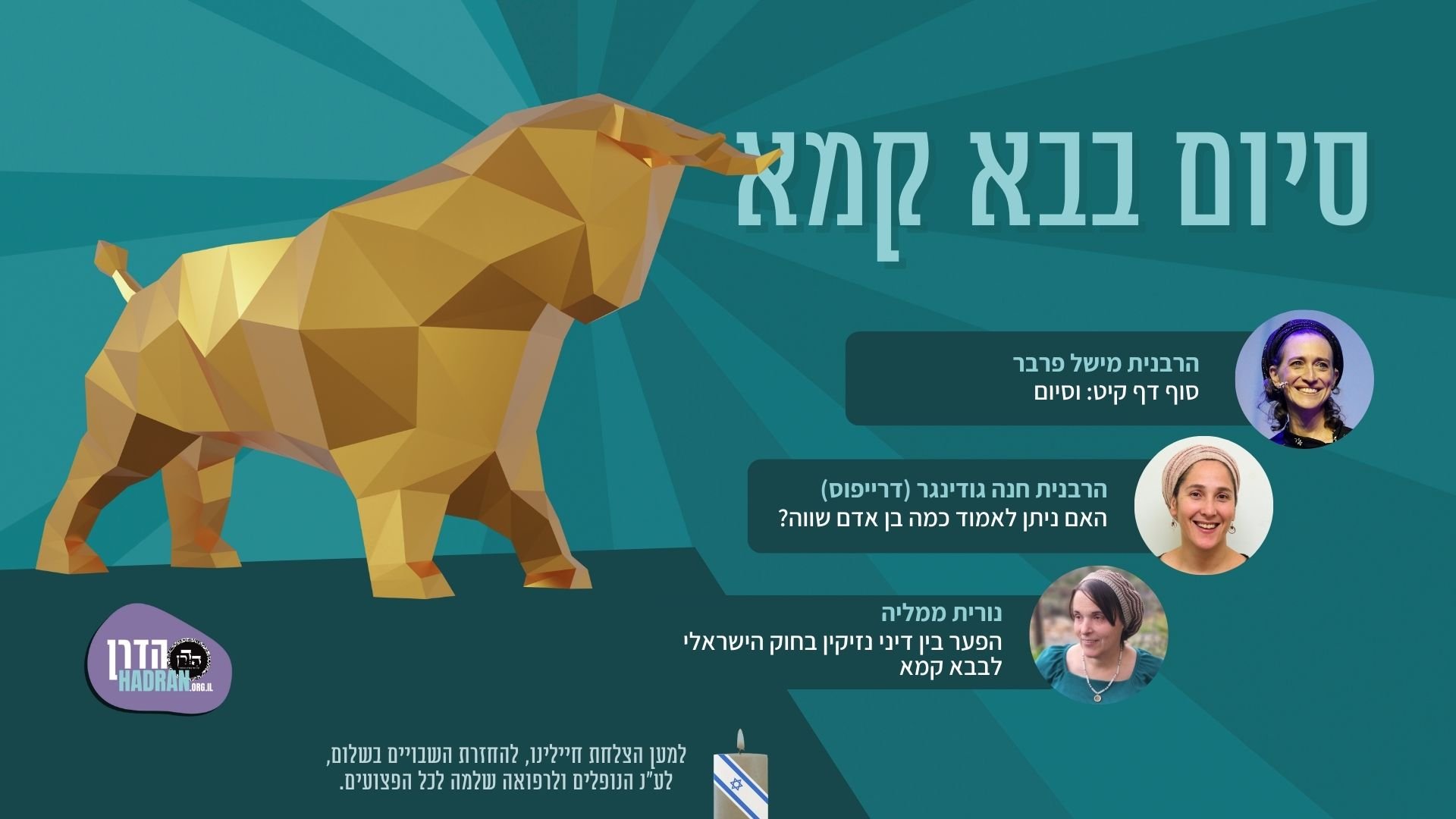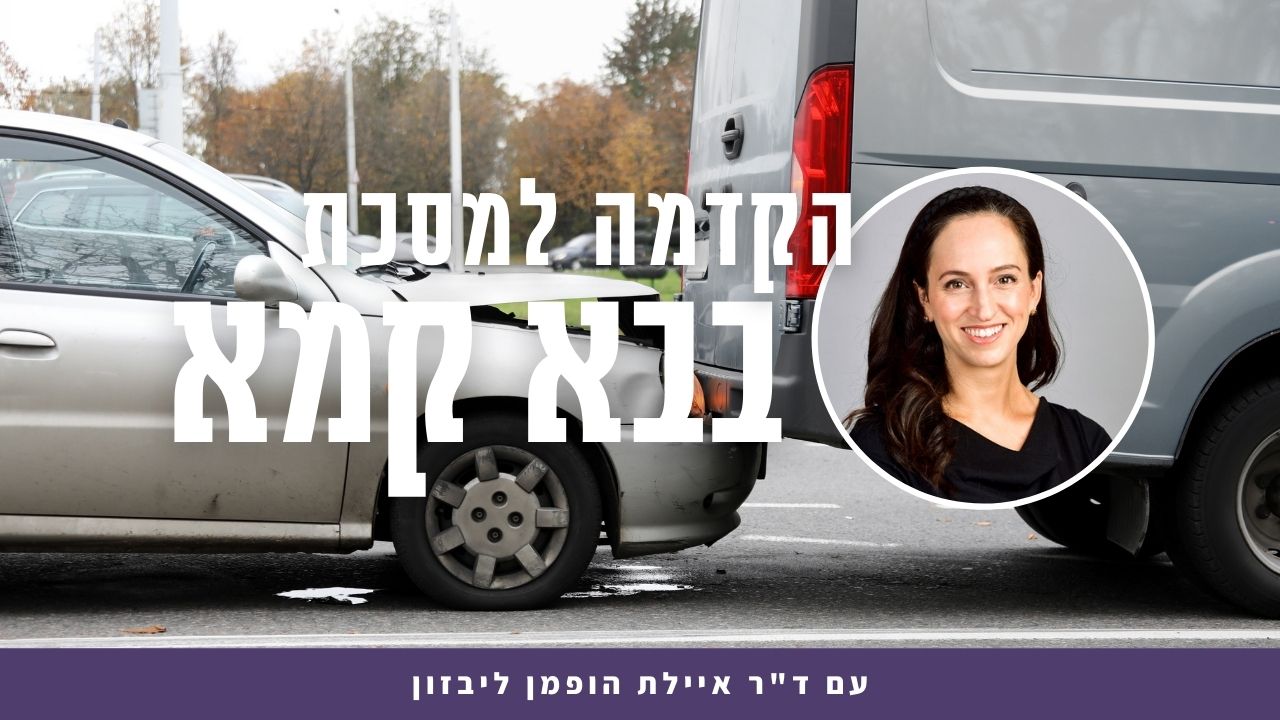בבא קמא קח
וּבָאוּ עֵדִים אַקַּמַּיְיתָא, וְהוֹדָה אַבָּתְרָיְיתָא. מַאי?
and witnesses come and testify with regard to his first claim that at the time he took an oath that the deposit had been stolen, it was actually in his possession; and he admits with regard to his second claim that it had been a lie and that it had not actually been lost, what is the halakha: Is he obligated to pay the additional one-fifth payment?
מָמוֹן הַמְחַיְּיבוֹ כֶּפֶל פּוֹטְרוֹ מִן הַחוֹמֶשׁ – וְהָא אִיחַיַּיב לֵיהּ עִילָּוֵיהּ כְּפֵילָא; אוֹ דִלְמָא שְׁבוּעָה הַמְחַיַּיבְתּוֹ כֶּפֶל פּוֹטַרְתּוֹ מִן הַחוֹמֶשׁ – וְהָא שְׁבוּעָה בָּתְרָיְיתָא, הוֹאִיל דְּלָא קָא מְחַיְּיבָא לֵיהּ כְּפֵילָא, תְּחַיְּיבֵיהּ חוּמְשָׁא?
The Gemara explains the two possibilities: Is it being obligated in a monetary obligation that renders him liable for double payment which exempts him from the additional one-fifth payment, and in this case he is liable for the double payment for the deposit due to the witness testimony and would therefore be exempt from the additional one-fifth payment? Or perhaps is it admitting to a false oath that renders him liable for double payment which exempts him from the additional one-fifth payment, and with regard to this latter oath that the item was lost, since it does not render him liable for the double payment, as he took an oath that it had been lost, not stolen, will it render him liable for the additional one-fifth payment?
אָמַר רָבָא: תָּא שְׁמַע, אָמַר לְאֶחָד מִן הַשּׁוּק: ״הֵיכָן שׁוֹרִי שֶׁגָּנַבְתָּ?״ וְהוּא אוֹמֵר: ״לֹא גָּנַבְתִּי״. ״מַשְׁבִּיעֲךָ אֲנִי״, וְאָמַר: ״אָמֵן״. וְהָעֵדִים מְעִידִים אוֹתוֹ שֶׁגְּנָבוֹ – מְשַׁלֵּם תַּשְׁלוּמֵי כֶפֶל. וְאִם הוֹדָה מֵעַצְמוֹ – מְשַׁלֵּם קֶרֶן וָחוֹמֶשׁ וְאָשָׁם.
Rava said: Come and hear a solution to this dilemma from a mishna (Shevuot 49b): In a scenario where one said to someone from the marketplace: Where is my ox that you stole? And the accused says in response: I did not steal it; whereupon the owner of the ox said: I administer an oath to you, and the accused said: Amen, accepting the oath; and the witnesses testify about the accused that he stole it, he must pay double payment. And if he admitted of his own accord that he stole it, then he must pay the principal and the additional one-fifth payment, and bring a guilt-offering.
וְהָא הָכָא, עֵדִים הוּא דִּמְחַיְּיבִי לֵיהּ כְּפֵילָא; הוֹדָה מֵעַצְמוֹ – אִין, אֲבָל הוֹדָה אַחַר עֵדִים – לָא;
Rava explains the proof: But here, it is witnesses who render him liable for the double payment, as since the accused was not a bailee, the oath does not render him liable, and yet the mishna teaches that if he admitted of his own accord that he stole it, then yes, he must pay the additional one-fifth payment, but if he admitted after witnesses testified, then no, he is not required to pay the additional one-fifth.
וְאִי סָלְקָא דַעְתָּךְ שְׁבוּעָה הַמְחַיַּיבְתּוֹ כֶּפֶל פּוֹטַרְתּוֹ מִן הַחוֹמֶשׁ, אַמַּאי הוֹדָה אַחַר עֵדִים לָא? מִכְּדִי הָא שְׁבוּעָה לָא קָא מְיחַיְּיבָא לֵיהּ כְּפֵילָא, תְּחַיְּיבֵיהּ חוּמְשָׁא!
Rava continues: And if it enters your mind to say that it is an oath that renders him liable for double payment which exempts him from the additional one-fifth payment, why does he not pay the additional one-fifth payment if he admitted that it was a false oath after witnesses testified? After all, this oath does not render him liable to pay the double payment, as the halakha that one who falsely takes an oath that the item was stolen pays double payment applies only in the case of a bailee; therefore, the oath should render him liable to pay the additional one-fifth payment, as does any false oath taken with regard to a monetary claim.
אֶלָּא לָאו שְׁמַע מִינַּהּ: מָמוֹן הַמְחַיְּיבוֹ כֶּפֶל – פּוֹטְר(תּ)וֹ מִן הַחוֹמֶשׁ? שְׁמַע מִינַּהּ.
Rava completes the proof: Rather, must one not conclude from this mishna that it is the monetary obligation that renders him liable to pay the double payment which exempts him from the additional one-fifth payment? The Gemara affirms: Conclude from the mishna that the additional one-fifth payment is dependent upon the type of monetary obligation, and not an oath, resolving Rami bar Ḥama’s dilemma.
בָּעֵי רָבִינָא: חוֹמֶשׁ וּכְפֵילָא בִּתְרֵי גַבְרֵי, מַאי? הֵיכִי דָּמֵי? כְּגוֹן שֶׁמָּסַר שׁוֹרוֹ לִשְׁנֵי בְּנֵי אָדָם, וְטָעֲנוּ בּוֹ טַעֲנַת גַּנָּב. חַד נִשְׁבַּע וְהוֹדָה, וְחַד נִשְׁבַּע וּבָאוּ עֵדִים. מַאי?
§ Concerning the additional one-fifth payment, Ravina raises a dilemma: If the additional one-fifth payment and the double payment are split among two men, what is the halakha? The Gemara explains the dilemma: What are the circumstances? This is referring to a case where one transferred his ox to two people to safeguard, and they stated the claim that a thief stole it from them; one of them took an oath that it had been stolen and subsequently admitted of his own accord that he had lied, and one of them took an oath that it had been stolen and subsequently witnesses came and testified that he had lied. What is the halakha in this case?
מִי אָמְרִינַן: בְּחַד גַּבְרָא קָפֵיד רַחֲמָנָא דְּלָא מְשַׁלֵּם חוּמְשָׁא וּכְפֵילָא; הַאי נְשַׁלֵּם כְּפֵילָא, וְהַאי נְשַׁלֵּם חוּמְשָׁא; אוֹ דִלְמָא, עִלָּוֵי חַד מָמוֹנָא קָפֵיד רַחֲמָנָא דְּלָא נְשַׁלֵּם עֲלֵהּ חוּמְשָׁא וּכְפֵילָא – וְהָכָא נָמֵי חַד מָמוֹנָא הוּא? תֵּיקוּ.
Ravina clarifies the possibilities: Do we say that the Merciful One is particular with regard to one man that he does not pay both the additional one-fifth payment and the double payment, whereas in this case, this one about whom the witnesses testified will pay the double payment and that one who admitted of his own accord will pay the additional one-fifth payment? Or perhaps the Merciful One is particular that the additional one-fifth payment and the double payment will not be paid for one monetary obligation, and here too, it is one monetary obligation? The Gemara comments: The dilemma shall stand unresolved.
בָּעֵי רַב פָּפָּא: תְּרֵי חוּמְשֵׁי אוֹ תְּרֵי כְפֵילֵי בְּחַד גַּבְרָא, מַאי? הֵיכִי דָּמֵי? שֶׁטָּעַן טַעֲנַת אָבַד, וְנִשְׁבַּע, וְהוֹדָה, וְחָזַר וְטָעַן טַעֲנַת אָבַד, וְנִשְׁבַּע, וְהוֹדָה. אִי נָמֵי, כְּגוֹן שֶׁטָּעַן טַעֲנַת גַּנָּב, וְנִשְׁבַּע, וּבָאוּ עֵדִים, וְחָזַר וְטָעַן טַעֲנַת גַּנָּב, וְנִשְׁבַּע, וּבָאוּ עֵדִים, מַאי?
§ Concerning the additional one-fifth payment, Rav Pappa raises a dilemma: In a case of two additional one-fifth payments or two double payments with regard to one man, what is the halakha; must he pay twice for the same monetary obligation? The Gemara explains: What are the circumstances? This is referring to a case where one stated the claim that the deposit was lost and took an oath and then admitted that it was not lost, and returned and again stated the claim that the same deposit was lost, and took another oath supporting this claim and again admitted that it was not lost. Alternatively, this is referring to a case where one stated the claim that a thief stole the deposit and took an oath and then witnesses came and testified that he had taken it, and he returned and again stated the claim that a thief stole the same deposit and again took an oath and then witnesses came and again testified that he had taken it; what is the halakha?
מִי אָמְרִינַן: תְּרֵי גַּוְונֵי מָמוֹנָא קָאָמַר רַחֲמָנָא דְּלָא נִשְׁתַּלְּמוּ עִילָּוֵי חַד מָמוֹנָא – וְהָכָא חַד גַּוְונָא הוּא; אוֹ דִלְמָא, תְּרֵי מָמוֹנֵי אָמַר רַחֲמָנָא דְּלָא לִשְׁתַּלְּמוּ עִילָּוֵי חַד מָמוֹנָא – וְהָכָא נָמֵי תְּרֵי מָמוֹנֵי נִינְהוּ?
Rav Pappa clarifies the possibilities: Do we say that the Merciful One states concerning two types of monetary restitution, e.g., double payment and the additional one-fifth payment, that they will not be paid for one monetary obligation, but here, it is only one type, merely doubled; or perhaps the Merciful One states concerning two payments of monetary restitution that they will not be paid for one monetary obligation, and here too, they are two payments of monetary restitution, whether in the case of two additional one-fifth payments or two double payments?
תָּא שְׁמַע, דְּאָמַר רָבָא: ״וַחֲמִשִׁתָיו יֹסֵף עָלָיו״ – הַתּוֹרָה רִיבְּתָה חֲמִישִׁיּוֹת הַרְבֵּה לְקֶרֶן אַחַת! שְׁמַע מִינַּהּ.
The Gemara suggests a resolution to Rav Pappa’s dilemma. Come and hear, as Rava says: The verse states: “Or anything about which he has sworn falsely, he shall restore it in full, and shall add the fifth part [ḥamishitav] more thereto” (Leviticus 5:24). By employing a plural term, ḥamishitav, and not the singular ḥamishito, the Torah added many additional one-fifths for one principal, meaning that one can become obligated in multiple one-fifth payments for the same principal. The Gemara affirms: Conclude from Rava’s statement that this is the halakha.
תְּבָעוּהוּ בְּעָלִים לַשּׁוֹמֵר, וְנִשְׁבַּע, וְשִׁילֵּם, וְהוּכַּר הַגַּנָּב – כֶּפֶל לְמִי? אַבָּיֵי אָמַר: לְבַעַל הַפִּקָּדוֹן, רָבָא אָמַר: לְמִי שֶׁהַפִּקָּדוֹן אֶצְלוֹ.
§ The Gemara discusses an amoraic dispute concerning a similar case: If an owner demanded of an unpaid bailee that he return a deposit, and he claimed that it had been stolen from him and took an oath to that effect, and despite being exempt from payment, he paid of his own volition, and subsequently the thief was identified, to whom is double payment paid, the owner or the bailee? Abaye says: To the owner of the deposit. Rava says: To the one in whose possession the deposit was when it was stolen, i.e., the bailee.
אַבָּיֵי אָמַר לְבַעַל הַפִּקָּדוֹן – כֵּיוָן דְּאַטְרְחֵיהּ בִּשְׁבוּעָה, לָא מַקְנֵי לֵיהּ כְּפֵילָא. רָבָא אָמַר לְמִי שֶׁהַפִּקָּדוֹן אֶצְלוֹ – כֵּיוָן דְּשִׁילֵּם, מַקְנֵי לֵיהּ כְּפֵילָא.
The Gemara explains their opinions: Abaye says that the double payment is paid to the owner of the deposit; since the bailee troubled him by taking an oath instead of paying immediately, the owner is not willing to grant acquisition of the double payment to the bailee, so it is paid to the owner. Rava says that the double payment is paid to the one in whose possession the deposit was when it was stolen; once he paid, the owner grants acquisition of the double payment to the bailee.
וְקָא מִיפַּלְגִי בְּדִיּוּקָא דְמַתְנִיתִין, דִּתְנַן: הַמַּפְקִיד אֵצֶל חֲבֵירוֹ בְּהֵמָה אוֹ כֵלִים, וְנִגְנְבוּ אוֹ שֶׁאָבְדוּ; שִׁילֵּם וְלֹא רָצָה לִישָּׁבַע – שֶׁהֲרֵי אָמְרוּ: שׁוֹמֵר חִנָּם נִשְׁבָּע וְיוֹצֵא; נִמְצָא הַגַּנָּב – מְשַׁלֵּם תַּשְׁלוּמֵי כֶפֶל. טָבַח וּמָכַר – מְשַׁלֵּם תַּשְׁלוּמֵי אַרְבָּעָה וַחֲמִשָּׁה. לְמִי הוּא מְשַׁלֵּם? לְמִי שֶׁהַפִּקָּדוֹן אֶצְלוֹ.
The Gemara explains: And they disagree with regard to the deductive inference to be drawn from the wording of the mishna, as we learned in a mishna (Bava Metzia 33b): In the case of one who deposits with another, i.e., an unpaid bailee, an animal or vessels, and they were stolen or lost, and the bailee paid the owner and did not wish to take an oath, which he may decide to do, as the Sages said that an unpaid bailee takes an oath that he is exempt and is released from the obligation to pay the owner, but may also opt to pay; in such a case the halakha is that if the thief was found he pays double payment, or if the deposited item was a sheep or an ox and the thief slaughtered or sold it he pays the fourfold or fivefold payment. To whom does the thief pay those payments? He pays them to the one in whose possession the deposit was when it was stolen or lost. When the bailee paid the owner for the stolen item, he acquired it and therefore is entitled to any payment of principal or fine paid by the thief.
נִשְׁבַּע וְלֹא רָצָה לְשַׁלֵּם, וְנִמְצָא הַגַּנָּב – מְשַׁלֵּם תַּשְׁלוּמֵי כֶפֶל. טָבַח וּמָכַר – מְשַׁלֵּם תַּשְׁלוּמֵי אַרְבָּעָה וַחֲמִשָּׁה. לְמִי הוּא מְשַׁלֵּם? לְבַעַל הַפִּקָּדוֹן.
The mishna continues: If the bailee took an oath and did not wish to pay, and the thief was later found and was required to pay double payment, or he slaughtered or sold the sheep or ox and was required to pay the fourfold or fivefold payment, to whom does the thief pay the money? He pays it to the owner of the deposit, not to the bailee.
אַבָּיֵי דָּיֵיק מֵרֵישָׁא, רָבָא דָּיֵיק מִסֵּיפָא. אַבָּיֵי דָּיֵיק מֵרֵישָׁא – דְּקָתָנֵי: שִׁילֵּם וְלֹא רָצָה לִישָּׁבַע. טַעְמָא דְּלֹא רָצָה לִישָּׁבַע,
The Gemara explains the dispute: Abaye inferred the halakha from the wording of the first clause, and Rava inferred the halakha from the wording of the latter clause. Abaye inferred it from the wording of the first clause, as it teaches: If the bailee paid the owner and did not wish to take an oath, the thief pays the double, fourfold, or fivefold payment to the bailee. Abaye infers from here that the reason the thief pays the bailee is specifically that he did not wish to take an oath,
הָא נִשְׁבַּע – אַף עַל פִּי שֶׁשִּׁילֵּם; לְמִי מְשַׁלֵּם? לְבַעַל הַפִּקָּדוֹן.
but if he took an oath, even though he subsequently paid, to whom does the thief pay double payment? To the owner of the deposit.
רָבָא דָּיֵיק מִסֵּיפָא – נִשְׁבַּע וְלֹא רָצָה לְשַׁלֵּם. טַעְמָא דְּלֹא רָצָה לְשַׁלֵּם, הָא שִׁילֵּם – אַף עַל פִּי שֶׁנִּשְׁבַּע; לְמִי מְשַׁלֵּם? לְמִי שֶׁהַפִּקָּדוֹן אֶצְלוֹ.
Rava inferred the halakha from the wording of the latter clause. It teaches: If the bailee took an oath and did not want to pay, the thief must pay the penalty to the owner of the deposit. Rava infers from here that the reason the thief pays the owner is specifically that he did not want to pay, but if he did pay, even though he took an oath previously, to whom does the thief pay double payment? To the one in whose possession the deposit was when it was lost.
לְאַבָּיֵי, קַשְׁיָא סֵיפָא! אָמַר לָךְ אַבָּיֵי, הָכִי קָתָנֵי: נִשְׁבַּע, וְלֹא רָצָה לְשַׁלֵּם קוֹדֶם הַשְּׁבוּעָה אֶלָּא לְאַחַר הַשְּׁבוּעָה, לְמִי מְשַׁלֵּם? לְבַעַל הַפִּקָּדוֹן. לְרָבָא, קַשְׁיָא רֵישָׁא! אָמַר לָךְ רָבָא, הָכִי קָתָנֵי: שִׁילֵּם, וְלֹא רָצָה לַעֲמוֹד בִּשְׁבוּעָתוֹ אֶלָּא שִׁילֵּם, לְמִי מְשַׁלֵּם? לְמִי שֶׁהַפִּקָּדוֹן אֶצְלוֹ.
The Gemara notes: The inference from the latter clause is difficult for the opinion of Abaye. The Gemara explains. Abaye could have said to you: This is what the latter clause of the mishna is teaching: If the bailee took an oath and did not want to pay initially before taking the oath, but rather wanted to pay only after having taken the oath, in this case to whom does the thief pay double payment? To the owner of the deposit. Similarly, the Gemara notes: The inference from the first clause is difficult for the opinion of Rava. The Gemara explains. Rava could have said to you: This is what the first clause of the mishna is teaching: If he paid, meaning he had taken an oath and did not want to stand by his oath, but instead paid in order to nullify the oath he had taken, to whom does the thief pay double payment? To the one in whose possession the deposit was when it was lost.
תְּבָעוּהוּ בְּעָלִים לַשּׁוֹמֵר, וְנִשְׁבַּע, וְהוּכַּר הַגַּנָּב; תְּבָעוֹ שׁוֹמֵר, וְהוֹדָה; תְּבָעוּהוּ בְּעָלִים, וְכָפַר, וְהֵבִיאוּ עֵדִים – מִי נִפְטַר הַגַּנָּב בְּהוֹדָאַת שׁוֹמֵר, אוֹ לֹא נִפְטַר הַגַּנָּב בְּהוֹדָאַת שׁוֹמֵר?
§ The Gemara relates another dilemma concerning the status of a bailee and stolen deposits. If the owner of a deposit demanded from a bailee that he return their deposit, and he claimed that it had been stolen from him and took an oath to that effect; and then the thief was recognized, and the bailee demanded of the thief to pay and he admitted to having stolen it; and then the owner demanded of the thief to pay and he denied the claim, and the owner brought witnesses that he had stolen it, did the thief become exempt from double payment through his admission to the bailee, as is the halakha when one admits liability to a penalty? Does the bailee have standing vis-à-vis the thief despite having exempted himself by taking an oath to the owner, or did the thief not become exempt through his admission to the bailee?
אָמַר רָבָא: אִם בֶּאֱמֶת נִשְׁבַּע – נִפְטַר הַגַּנָּב בְּהוֹדָאַת שׁוֹמֵר. אִם בְּשֶׁקֶר נִשְׁבַּע – לֹא נִפְטַר הַגַּנָּב בְּהוֹדָאַת שׁוֹמֵר.
Rava says: If he took an oath truthfully, i.e., if it now becomes clear through the testimony of witnesses that the bailee’s oath was true, he is assumed to be someone the owner would rely on to collect the stolen item for him, and he remains a bailee. Therefore, the thief became exempt through his admission to the bailee. If his oath was taken falsely, e.g., he took an oath that the animal given as a deposit died naturally and it is now clear that his oath was false, he is assumed to be someone whom the owner would not rely on to collect the stolen item for them, and he is no longer a bailee. In this case, the thief did not become exempt through his admission to the bailee.
בָּעֵי רָבָא: עָמַד לִישָּׁבַע בְּשֶׁקֶר וְלֹא הִנִּיחוּהוּ, מַהוּ? תֵּיקוּ. רַב כָּהֲנָא מַתְנֵי הָכִי; רַב טָבְיוֹמֵי מַתְנֵי – בָּעֵי רָבָא: נִשְׁבַּע לַשֶּׁקֶר, מַהוּ? תֵּיקוּ.
Rava raises a dilemma concerning the previous ruling: If a bailee rose to take a false oath but the owner did not let him, what is the halakha? Should he be considered as one who had taken a false oath, as that was his intention, and he is no longer a bailee; or, since he never actually took the false oath, he is still a bailee? The Gemara comments: The question shall stand unresolved. The Gemara notes that Rav Kahana would teach Rava’s question like this, as quoted above. Rav Tavyumei would teach Rava’s question differently: Rava raises a dilemma: If he actually took a false oath, what is the halakha? Is he still a bailee or not? The Gemara comments: The question shall stand unresolved.
תְּבָעוּהוּ בְּעָלִים לַשּׁוֹמֵר – וְשִׁילֵּם, וְהוּכַּר הַגַּנָּב, תְּבָעוּהוּ בְּעָלִים – וְהוֹדָה, תְּבָעוֹ שׁוֹמֵר – וְכָפַר, וְהֵבִיא עֵדִים; נִפְטַר גַּנָּב בְּהוֹדָאַת בְּעָלִים, אוֹ לֹא?
The Gemara relates another dilemma concerning the status of a bailee and stolen deposits: If the owners of a deposit demanded from a bailee that he return their deposit and he paid them instead of taking an oath, and then the thief was recognized, and the owners demanded of the thief to pay and he admitted to having stolen it; and then the bailee demanded of the thief to pay and he denied the claim, and the bailee brought witnesses that he had stolen it, did the thief become exempt from double payment through his admission to the owners, as is the halakha when one admits liability to a penalty, or not?
מִי אָמְרִינַן מָצֵי אָמַר לֵיהּ שׁוֹמֵר לִבְעָלִים: ״אַתּוּן, כֵּיוָן דְּשָׁקְלִיתוּ לְכוּ דְּמֵי – אִסְתְּלִיקְתּוּ לְכוּ מֵהָכָא״; אוֹ דִלְמָא, מָצֵי אָמְרִי לֵיהּ: ״כִּי הֵיכִי דְּאַתְּ עֲבַדְתְּ לַן מִילְּתָא, אֲנַן נָמֵי עָבְדִינַן לָךְ – טָרְחִינַן בָּתַר גַּנָּבָא; (שָׁקֵלְנָא) [שָׁקְלִינַן] אֲנַן דִּידַן, וּשְׁקוֹל אַתְּ דִּידָךְ״? תֵּיקוּ.
The Gemara explains: Do we say that the bailee can say to the owners: Once you took your money from me you removed yourselves from here and have no further connection to this deposit. Therefore, I am now considered the owner of the stolen item and the right to the double payment is mine, and the thief’s admission to you is meaningless. Or perhaps the owners can say to him: Just as you performed a service for us by paying us when you were not obligated, we performed a service for you as well. Instead of granting acquisition of the double payment to you, to enable you to be repaid we took the trouble to search after the thief. We will take what is ours, i.e., the stolen item, and you take what is yours, the money you paid us. The Gemara comments: The question shall stand unresolved.
אִתְּמַר: נִגְנְבָה בְּאוֹנֶס וְהוּכַּר הַגַּנָּב, אָמַר אַבָּיֵי: אִם שׁוֹמֵר חִנָּם הוּא – רָצָה עוֹשֶׂה עִמּוֹ דִּין, רָצָה נִשְׁבָּע. אִם שׁוֹמֵר שָׂכָר הוּא – עוֹשֶׂה עִמּוֹ דִּין, וְאֵינוֹ נִשְׁבָּע. רָבָא אָמַר: אֶחָד זֶה וְאֶחָד זֶה – עוֹשֶׂה עִמּוֹ דִּין וְאֵינוֹ נִשְׁבָּע.
§ It was stated: If an animal given as a deposit was stolen in circumstances beyond the control of the bailee, who is therefore exempt from liability regardless of whether he was paid, and the thief was recognized, Abaye says: If he is an unpaid bailee, then if he so desires he can choose to enter into judgment with the thief, i.e., the bailee will pay the owner and then get reimbursed by the thief; and if he so desires he can take an oath that he was not responsible and the owner can demand his money from the thief. If he is a paid bailee he enters into judgment with the thief and does not have the option to take an oath to become exempt, as the responsibility to collect payment from the thief is part of his duty as a paid bailee. Rava says: Whether this unpaid bailee or that paid bailee enters into judgment with the thief, he does not have the option to take an oath.
לֵימָא פְּלִיגָא אַדְּרַב הוּנָא בַּר אָבִין? דִּשְׁלַח רַב הוּנָא בַּר אָבִין: נִגְנְבָה בְּאוֹנֶס וְהוּכַּר הַגַּנָּב, אִם שׁוֹמֵר חִנָּם הוּא – רָצָה עוֹשֶׂה עִמּוֹ דִּין, רָצָה נִשְׁבָּע; וְאִם שׁוֹמֵר שָׂכָר הוּא – עוֹשֶׂה עִמּוֹ דִּין וְאֵינוֹ נִשְׁבָּע.
The Gemara suggests: Shall we say that Rava disagrees with the ruling of Rav Huna bar Avin? As Rav Huna bar Avin sent this ruling: If an animal given as a deposit was stolen in circumstances beyond the control of the bailee and the thief was recognized, if he is an unpaid bailee, then if he so desires he can choose to enter into judgment with the thief; and if he so desires he can take an oath that he was not responsible, and the owner can demand his money from the thief. And if he is a paid bailee, then he enters into judgment with the thief and does not have the option to take an oath.
אָמַר לָךְ רָבָא: הָכָא בְּמַאי עָסְקִינַן – כְּגוֹן שֶׁקָּדַם וְנִשְׁבַּע. וְהָא ״רָצָה עוֹשֶׂה עִמּוֹ דִּין, רָצָה נִשְׁבָּע״ קָאָמַר! הָכִי קָאָמַר: רָצָה שׁוֹמֵר חִנָּם – עוֹמֵד בִּשְׁבוּעָתוֹ, רָצָה – עוֹשֶׂה עִמּוֹ דִּין.
The Gemara responds: Rava could have said to you: With what are we dealing here? We are dealing with a case where it happened that first the bailee took an oath, before the thief was recognized. The Gemara questions this explanation: But Rav Huna bar Avin says: If he so desires he can choose to enter into judgment with the thief; and if he so desires he can take an oath that he was not responsible, indicating that the bailee had not yet taken an oath. The Gemara answers: Rather, this is what Rav Huna bar Avin is saying: Having first taken an oath before the thief was recognized, if an unpaid bailee so desires he can remain with his oath and not pay the owner, and if he so desires he can choose to enter into judgment with the thief.
רַבָּה זוּטֵי בָּעֵי לַהּ הָכִי: נִגְנְבָה בְּאוֹנֶס, וְהֶחְזִיר גַּנָּב בְּבֵית שׁוֹמֵר, וּמֵתָה בִּפְשִׁיעָה, מַהוּ? מִי אָמְרִינַן: כֵּיוָן דְּנִגְנְבָה בְּאוֹנֶס – כָּלְיָא לֵיהּ שְׁמִירָתוֹ, אוֹ דִלְמָא כֵּיוָן דְּ[אַ]הְדְּרַהּ – הֲדַרָה לִשְׁמִירָתוֹ? תֵּיקוּ.
Rabba Zuti raises the dilemma like this: If an animal given as a deposit was stolen in circumstances beyond the control of the bailee, and the thief returned the animal to the place from where he had stolen it, and it is now in the house of the bailee, and it then died through the bailee’s negligence, what is the halakha? Do we say that once it was stolen in circumstances beyond the bailee’s control his guardianship is completed and he has no more responsibility for the animal, even for subsequent negligence? Or perhaps once it was returned, it returned to his guardianship, and an unpaid bailee is liable for loss resulting from negligence? The Gemara comments: The question shall stand unresolved.
מַתְנִי׳ ״הֵיכָן פִּקְדוֹנִי?״ אָמַר לוֹ: ״אָבַד״. ״מַשְׁבִּיעֲךָ אֲנִי״, וְאָמַר ״אָמֵן״, וְהָעֵדִים מְעִידִים אוֹתוֹ שֶׁאֲכָלוֹ – מְשַׁלֵּם קֶרֶן. [הוֹדָה מֵעַצְמוֹ – מְשַׁלֵּם קֶרֶן וָחוֹמֶשׁ וְאָשָׁם.]
MISHNA: If the owner asked the bailee: Where is my deposit? And the bailee said to him: It was lost. And the owner said: I administer an oath to you, and the bailee said: Amen, therefore accepting the oath; and the witnesses testify about the bailee that he consumed it, then he must pay the principal. If the bailee admitted on his own that he had taken a false oath, then he must pay the principal and the additional one-fifth payment, and bring a guilt-offering.
״הֵיכָן פִּקְדוֹנִי?״ אָמַר לוֹ: ״נִגְנַב״. ״מַשְׁבִּיעֲךָ אֲנִי״, וְאָמַר: ״אָמֵן״, וְהָעֵדִים מְעִידִים אוֹתוֹ שֶׁגְּנָבוֹ – מְשַׁלֵּם תַּשְׁלוּמֵי כֶפֶל. הוֹדָה מֵעַצְמוֹ – מְשַׁלֵּם קֶרֶן, חוֹמֶשׁ וְאָשָׁם.
If the owner asked the bailee: Where is my deposit, and the bailee said to him: It was stolen; and the owner said: I administer an oath to you, and the bailee said: Amen, therefore accepting the oath; and the witnesses testify about the bailee that he stole it, he must pay the payment of double the principal. If the bailee admitted on his own that he had taken a false oath, then he must pay the principal, the additional one-fifth payment, and bring a guilt-offering.
הַגּוֹזֵל אֶת אָבִיו, וְנִשְׁבַּע לוֹ, וָמֵת – הֲרֵי זֶה מְשַׁלֵּם קֶרֶן וָחוֹמֶשׁ וְאָשָׁם לְבָנָיו אוֹ לְאֶחָיו. וְאִם אֵינוֹ רוֹצֶה אוֹ שֶׁאֵין לוֹ – לֹוֶה וּבַעֲלֵי חוֹב בָּאִין וְנִפְרָעִים.
The mishna continues: In the case of one who robs his father and the father demands that he return the stolen item, and he takes an oath to his father that he did not rob him; and then the father dies; and then the son admits that he robbed him and took a false oath, necessitating the return of the principal and the giving of the additional one-fifth payment to his father’s heirs, of which he is either one of several or the only one; what should he do? This son pays the principal and the additional one-fifth payment to his father’s sons or brothers, and brings a guilt-offering and does not keep his own share. And if he does not want to forfeit his share or where he does not have sufficient funds to pay the other heirs while forfeiting his share, he borrows money in the amount of the value of the stolen item and the creditors come and are repaid in part from his share in the stolen item.
הָאוֹמֵר לִבְנוֹ: ״קוּנָּם אִי אַתָּה נֶהֱנֶה מִשֶּׁלִּי״, אִם מֵת – יִירָשֶׁנּוּ.
In the case of one who says to his son in a vow: It is forbidden like an offering [konam], and for that reason you may not derive benefit from my property, if the father then dies the son inherits from him, because it is no longer the father’s property once he dies.
































